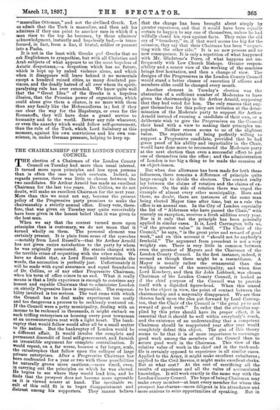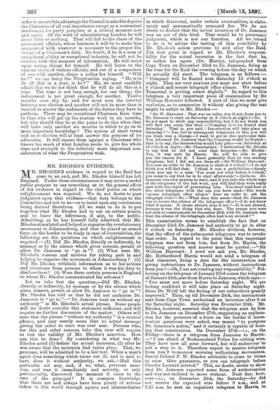THE CHAIRMANSHIP OF THE LONDON COUNTY COUNCIL. T HE election of
a Chairman of the London County Council on Tuesday had more than usual interest. It turned more upon principles and less upon persons than is often the case in such contests. Indeed, as regards persons, there was little to choose between the two candidates. Sir Arthur Arnold has made an excellent Chairman for the last two years. Dr. Collins, we do not doubt, will make an excellent Chairman for the next year. More than this we must not say, because the present policy of the Progressive party promises to make the chairmanship a strictly annual office. Every vote, there- fore, that was given on Tuesday may quite conceivably have been given in the honest belief that it was given to the beet man.
When we say that the contest turned more upon principles than is customary, we do not mean that it turned wholly on them. The personal element was certainly present. It is plain from some of the speeches —notably from Lord Russell's—that Sir Arthur Arnold has not given entire satisfaction to the party by whom be was originally nominated. He stands charged with the terrible crime of coquetting with the other side. We have no doubt that, as Lord Russell understands the words, the accusation is perfectly just. Unfortunately it will be made with equal assurance and equal 'foundation of Dr. Collins, or of any other Progressive Chairman, when his term of office comes to an end. What it really means is that a little experience is enough to convince any honest and capable Chairman that to administer London on strictly Progressive lines is impossible. The responsi- bility involved is too serious. The vast sums with which the Council has to deal make experiment too costly and too dangerous a process to be recklessly ventured on. If the Council were a petty municipality, dealing with an income to be reckoned in thousands, it might embark on such trifling enterprises as housing every poor townsman at an unremunerative rent with a light heart. The bank- ruptcy that would follow would after all be a small matter to the nation. But the bankruptcy of London would be a different affair. It would involve the complete and permanent discredit of local self-government, and furnish an irresistible argument for complete centralisation. It would repeat, on a far worse, because a far larger, scale, the catastrophes that follow upon the collapse of large private enterprises. After a Progressive Chairman has been confronted for a year or two with these possibilities he naturally grows more cautious.—more timid, even, in carrying out the principles on which he was elected. He begins to see where they would lead him, and he finds that the prospect does not become more agreeable as it is viewed nearer at hand. The inevitable re- sult of this cold fit is to beget disappointment and distrust among his supporters. They cannot believe that the change has been brought about simply by greater experience, and that it would have been equally certain to happen to any one of themselves, unless he had wilfully closed his eyes against facts. They raise the old cry of " treachery," or, if that word seems too big for the occasion, they say that their Chairman has been " coquet- ting with the other side." It is no new process and no new consequence. It is only a repetition of what happened with Mr. Gladstone's Peers, of what happens not un- frequently with Low Church Bishops. Greater respon- sibility and a nearer view of the working of the machine brings first hesitation, and then a change of view. The designs of the Progressives in the London County Council would stand a better chance of execution if officers and members alike could be changed every month.
Another element in Tuesday's election was the abstention of a sufficient number of Moderates to have given the chairmanship to Sir Arthur Arnold, supposing that they had voted for him. The only reasons that sug- gest themselves for this policy are irritation at the deter- mination of the Moderate party to support Sir Arthur Arnold instead of running a candidate of their own, or a deliberate wish to give the Progressives on the Council their head with a view to making their principles un- popular. Neither reason seems to us of the slightest value. The reputation of being perfectly willing to support a Progressive candidate, provided that he had given proof of his ability and impartiality in the Chair, would have done more to recommend the Moderate party at the next election than even a successful effort to put one of themselves into the office ; and the administration of London is too big a thing to be made the occasion of an object-lesson.
But when due allowance has been made for both these influences, there remains a difference of principle quite large enough to divide the electors. The contest really lay between the claims of rotation and the claims of ex- perience. On the side of rotation there was urged the example of almost every other municipality. Here and there, no doubt, there are instances of the same man being elected Mayor time after time, but as a rule the office is an annual one. In the City of London especially the list of " Aldermen who have passed the Chair," with scarcely an exception, receives a fresh addition every year. Nor is it only that the principle has been generally applied in similar cases. It is, Lord Carrington tells us, " of the greatest value" in itself. " The Chair of the Council," he says, " is the great prize and reward of good work," and on this account it " should not be anybody's freehold." The argument from precedent is not a very weighty one. There is very little in common between even the greatest of Mayors and the Chairman of the London County Council. In the first instance, indeed, it seemed as though there might be a resemblance. A Mayor is usually rather the ornamental than the working member of the municipality, and when first Lord Rosebery, and then Sir John Lubbock, was chosen Chairman of the London County Council, it looked as if the chief purpose of the Council was to provide itself with a dignified figure-head. When this ceased to be the object in view, the point of contact between the chairmanship and a mayoralty disappeared. We are thus thrown back upon the plea put forward by Lord Carring- ton, tbat the Chair of the Council is "the great prize and reward of good work." In order that the stimulus sup- plied by this prize should have its proper effect, it is essential that it should be well within everybody's reach, and the existence of an understanding that a competent Chairman should be reappointed year after year would completely defeat this object. The gist of this theory seems to be that it is of more importance to encourage good work among the members of the Council than to secure good work in the Chairman. This view of the relative value of work in the chief and in the rank-and- file is certainly opposed to experience in all similar cases. Applied to the Army, it might make excellent subalterns ; applied to the Civil Service, it might make excellent clerks. But at what cost? At the cost of sacrificing all the results of experience and all the value of accumulated knowledge. It will work exactly in the same way with the London County Council. The hope of being Chairman may make every member—at least every member for whom the prospect has charms—more diligent in his attendance and more anxious to seize opportunities of speaking. But in srder to secure this advantage the Council is asked to deprive the Chairman of all real importance except as a convenient .instrument for party purposes at a critical moment now .-and again. Of the work of administering London he will 4mow little or nothing. That will fall to the share of the permanent officials, whose business it will be to make him acquainted with whatever is necessary to the proper dig- .ebarge of a Chairman's duty. No doubt, if he is a man of exceptional ability or exceptional industry, he will not be -content with this measure of information. He will insist upon seeing things for himself. He will listen to the -various views of various officials, and out of a comparison of one with another, shape a policy for himself. " Will he ?" we can fancy the Progressives saying. " He is to -do all this in a year, is he ?" No, we must candidly admit that we do not think that he will do all this in a -year. The time is not long enough, for one thing; the inducement is not great enough, for another. Twelve months soon slip by, and for most men the interval between one election and another will not be more than is wanted to master the rudiments of the duties they have to 'perform. There may be exceptional Chairmen from time to time who will get up the routine work in six months, but why should they be at the pains to do this when they will have only another six months in which to go on to more important knowledge ? The system of short terms and no re-election will at least answer the purpose of its -advocates. It will ensure them against a Chairman who • knows too much of what London needs to give his whole time and strength to the infinitely more important con- aideration of what the Progressives wish.



































 Previous page
Previous page